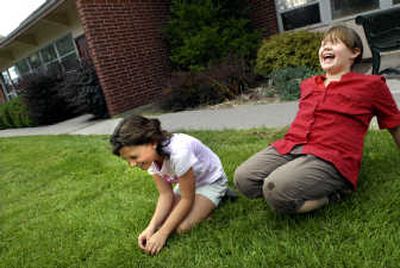Pratt School’s closure can’t stop friendship

Just like Laverne and Shirley, 9-year-olds Ashley Hoover and Marissa Murinko have a sort of girlfriend theme song.
They sang it when they jumped rope, stomping out its cadence on the Pratt School asphalt. They clapped it out on their hands whenever they tired of chasing Jason “Crew” Baldwin, the cutest third-grade boy ever.
As summer wound down last Thursday, they sang it together one last time, unsure of when they might get the chance again.
“Mable, Mable, set the table
“Just as fast as you are able.
“And don’t forget the
“Red hot peppers!”
For the first time in what seems like forever to the Edgecliff girls, Ashley and Marissa will not be in class together when school starts this week. A $10.8 million deficit in the Spokane School District shuttered Pratt last spring. Fallout over the closure has torn a huge hole in the fabric of the community.
The girls, who live a short bicycle ride from one another, are headed to different schools. Ashley will attend Lincoln Heights Elementary, where it’s expected she’ll be joined by 160 other Pratt children. Marissa is headed to Sheridan School with 50 Pratt mates, and sort of feels like the odd girl out. She knows the names of only two children from her third-grade class who are also making the trip.
“We’ve talked about it a little bit,” said Ashley, a little pixie of a girl who barely comes up to Marissa’s chin, “about how we’re going to have to spend time together. We’re just going to have to try harder.”
It’s hard to stay buds when you don’t even ride the same bus. Parents are realizing it’s harder still to know your neighbors if their kids no longer come around. And this is a community that knows the consequences of estrangement.
Edgecliff once was a neighborhood beaten down by methamphetamine and drug-related crime. Less than a decade ago, it had one of the highest crime rates in the region.
But seven years ago Edgecliff started working through its children to improve the neighborhood. They started summer and after-school programs, parenting classes, book drives. They built a computer lab to give students a leg up. Neighbors got to know each other in the process, and over several years, they wrested their community back from drugs and crime. They made the playgrounds safe again for little girls to jump rope.
“This whole process (the closing of Pratt) was a lot harder on the teachers and the parents than the kids,” said Kerry Murinko, Marissa’s mom. “It’s a different atmosphere here. There were only 12 teachers in the whole building, K through 12.”
Murinko, who works at Home Depot in north Spokane, spent her two days off a week volunteering at Pratt. She plans to volunteer at Sheridan, as well, though she expects it won’t be the same.
The school is huge compared with Pratt, she said. Marissa agreed. Sheridan is two stories tall. It’s like two Pratts stacked together. It’s also nearly 30 blocks from Murinko’s home.
Pratt is less than two blocks from the Murinkos. With a little effort you could walk into the street and see the southwest corner of Pratt playground, where Marissa and Ashley would meet every morning before school.
At the corner, two panels of a chewed up chain-link fence converge as a backstop to keep children out of Fourth Avenue and Bradley Street.
Marissa would get to the corner first. Ashley would come marching north down Bradley with a passel of children shepherded by one of the local community policing volunteers. With a quarter block to go she’d break rank and split the air with a loud “Marissa!”
Marissa would respond with a raised forearm and a bashful quiver of the hand.
Just east of that corner Thursday, having sung their theme and pelted each other with torn summer grass, they headed to school one last time.
“Want to go inside our class?” Ashley asked.
“Sure,” Marissa said, rising to walk to the window of their third-grade room almost before she got the word out.
But the classroom was empty, the reflection in its windowpane uncomfortably transparent.